Editor’s note: The following work by Arminius Vámbéry is extracted from The Great Events by Famous Historians, Vol. VIII (published 1905). All spelling in the original.
From the time (1354) when the Turks took Gallipoli and secured their first dominion in Europe, the Ottoman power on that side of the Hellespont was gradually increased. In 1360 Amurath I crossed from Asia Minor, ravaged an extensive district, and took Adrianople, which he made the first seat of his royalty and the first shrine of Mahometanism in Europe. He next turned toward Bulgaria and Servia, where in the warlike Slavonic tribes he found far stronger foes than the Greek victims of earlier Turkish conquests.
Pope Urban V preached a crusade against the Turks; and Servia, Hungary, Bosnia, and Wallachia leagued themselves to drive the Ottomans out of Europe. Amurath defeated them and added new territory to his previous acquisitions. A peace was made in 1376, but a new though fruitless attempt of the Slavonic peoples against him gave Amurath a pretext for further assault upon southeastern Europe. In 1389 he conquered and annexed Bulgaria and subjugated the Servians. In the same year Amurath was assassinated.
Bajazet I, the son and successor of Amurath, still further extended the Turkish conquests. Under Bajazet’s son, Mahomet I (1413-1421), comparative peace prevailed; but his son, Amurath II, rekindled the flames of war. A strong combination, including, with other peoples, the Hungarians and Poles, was made against him. In the struggle that followed, and which for a time promised the complete expulsion of the Turks from Europe, the great leader was the Hungarian, John Hunyady, born in 1388. According to some writers, he was a Wallach and the son of a common soldier. Creasy calls him “the illegitimate son of Sigismund, King of Hungary, and the fair Elizabeth Morsiney.” With him appeared a new spirit, such as the Ottomans up to that time could not have expected to encounter in that part of Europe. In Vambéry’s narrative we have the authority of Hungary’s greatest historian for the leading events in the life of her greatest hero.
In Europe a new power pulsating with youthful life had arrived from somewhere in the interior of Asia with the intention of conquering the world. This power was the Turk—not merely a single nation, but a whole group of peoples clustered round a nation, inspired by one single idea which urged them ever forward — “There is no god but God, and Mahomet is the apostle of God.”
The Mahometan flood already beat upon the bounds of Catholic Christendom, in the forefront of which stood Hungary. Hungary’s King, Sigismund, was able for a moment in 1396 to unite the nations of Europe against the common danger, but the proud array of mail-clad knights were swept away like chaff before the steady ranks of the janizaries.
And herewith began the long series of desolating inroads into Hungary, for the Turks were wont to suck the blood of the nation they had marked down as their prey. They took the country by surprise, secretly, suddenly, like a summer storm, appearing in overwhelming numbers, burning, murdering, robbing, especially men in the hopes of a rich ransom, or children whom they might bring up as Mahometans and janizaries. This body, the flower of the Turkish armies, owed its origin for the most part to the Christian children thus stolen from their parents and their country. This infantry of the janizaries was the first standing army in Europe. Living constantly together under a common discipline, like the inmates of a cloister, they rushed blindly forward to the cry of “God and his Prophet!” like some splendid, powerful wild beast eager for prey. The Turkish sultans published the proud order: “Forward! Let us conquer the whole world; wheresoever we tie up our horses’ heads, that land is our own.”
To resist such a nation, that would not listen to negotiation, but only thirsted for war and conquest, seemed already an impossibility. Europe trembled with fear at the reports of the formidable attacks designed against her, and listened anxiously for news from distant Hungary, which lay, so to say, in the lion’s very mouth.
Against such an enemy a soldier of the modern type was useless, one who slays only in defence of his own life and at the word of command, whose force consists in the high development of the military art and the murderous instruments of modern technical science. What was wanted was a heroic soul, inspired by a burning faith like to that which impelled the Mahometan soldier. This heroic soul, this burning faith, united to the tenacious energy of youth, were all found united in John Hunyady, accompanied withal by a singular talent for leadership in war. He could not rely for support upon the haughty magnates who could trace their descent back for centuries and despised the parvenu with a shorter pedigree and a smaller estate. He was consequently obliged to cast in his lot with the mass of the lesser nobility, individually weaker, it is true, but not deficient in spirit and a consciousness of their own worth. Of this class he soon became the idolized leader. Around him gathered the hitherto latent forces of Hungarian society, especially from Transylvania and South Hungary and the Great Hungarian Plain, which suffered most from the incursions of the Turks, and were therefore most impressed with the necessity of organizing a system of defence. It was these who were the first to be inspired by Hunyady’s heroic spirit.
Before commencing his career as independent commander he, following his father’s example, attached himself to the court of Sigismund, the Emperor-king, in whose train he visited the countries of Western Europe, Germany, England, and Italy, till he at length returned home, his mind enriched by experience but with the fervor of his first faith unchilled.
When over fifty years old, he repaired at his sovereign’s command to the south of Hungary to organize the resistance to the Turks. At first he was appointed ban of Severin, and as such had the chief command of the fortified places built by the Hungarians for the defence of the Lower Danube. After that he became waywode of Transylvania, the civil and military governor of the southeastern corner of the Hungarian kingdom.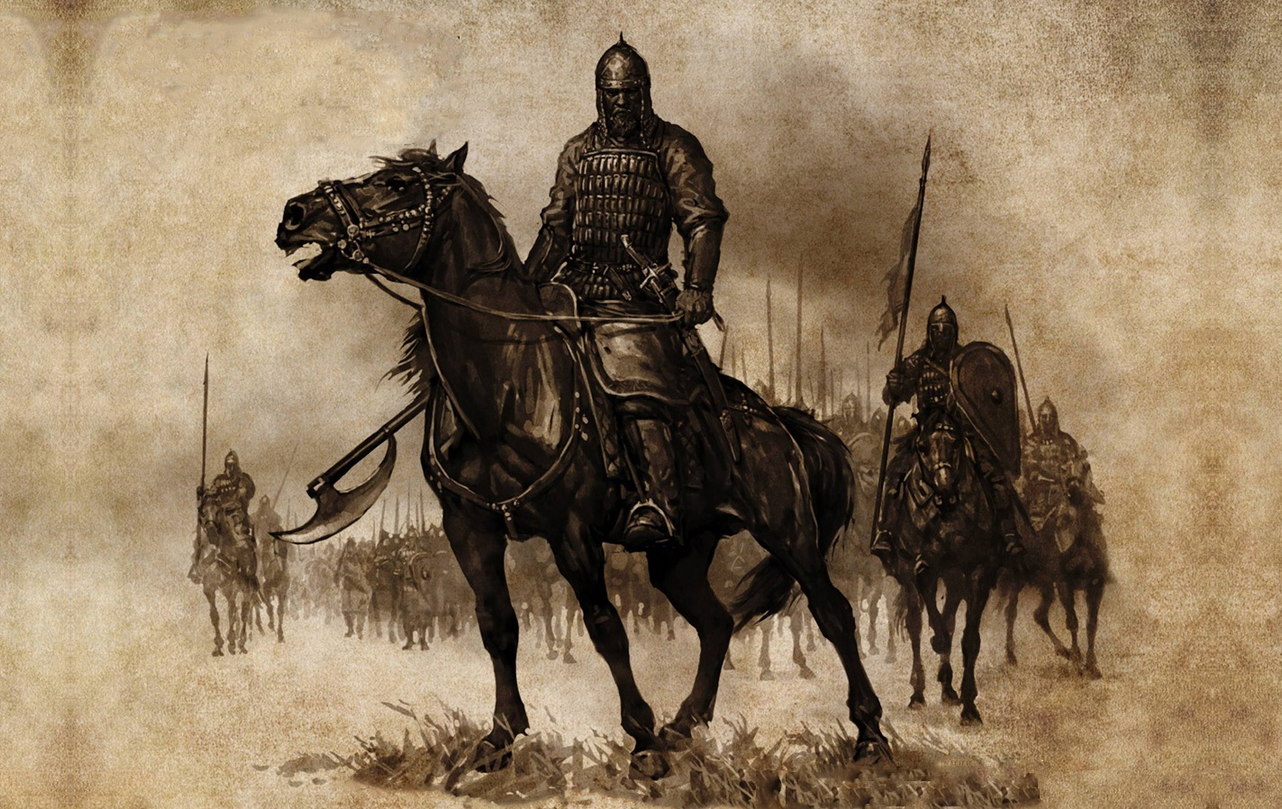
Before, however, he had reached these dignities he had fought a succession of battles and skirmishes with such success that for the fanatical Turkish soldiery his form, nay, his very name, was an object of terror. It was Hunyady alone whom they sought to slay on the field of battle, well persuaded that, he once slain, they would easily deal with the rest of Hungary. Thus in 1442 a Turkish leader, named Mezid Bey, burst into Transylvania at the head of eighty thousand men in pursuance of the Sultan’s commands, with no other aim than to take Hunyady dead or alive.
Nor, indeed, did Hunyady keep them waiting for him. He hurried at the head of his troops to attack the Turkish leader, who was laying siege to Hermannstadt. Upon this, Mezid Bey, calling his bravest soldiers around him, described to them once more Hunyady’s appearance, his arms, his dress, his stature, and his horse, that they might certainly recognize him. “Slay him only,” he exclaimed, “and we shall easily deal with the rest of them; we shall drive them like a flock of sheep into the presence of our august master.”
On that occasion was seen with what self-sacrificing enthusiasm his soldiers loved their heroic leader. When they learned from their spies the purpose of the Turks, they took all possible measures to secure his precious life. One of their number, Simon Kemeny, who bore a striking resemblance to Hunyady, determined to sacrifice himself for his leader. He announced that he would put on Hunyady’s clothes and armor. The Turks would then attack him under the belief that he was the celebrated chief, and while they were thus engaged the real Hunyady would fall upon them unexpectedly and put them to flight. At first Hunyady would by no means consent to this plan, as he did not wish to expose Kemeny to such mortal danger; but at last, seeing the great military advantages likely to accrue from it, he consented.
And so, indeed, it fell out. As soon as the battle began, the Turks, perceiving Simon Kemeny in the garb of Hunyady, directed all their force against him. Kemeny, after a stout defence, fell, together with a great number of his followers, and the Turks, seeing him fall, set up a general cry of triumph and exultation. Just at this critical moment they were hotly attacked in the flank by the genuine Hunyady. Thus attacked in the very moment when they imagined that they had already gained the day, the Turks were thrown into confusion and took wildly to flight. Twenty thousand corpses were left on the battlefield; among them lay Mezid Bey himself, together with his sons.
Fearful was the rage of the Turkish Sultan when he heard of the defeat and death of Mezid Bey, and he at once despatched another army against Hunyady, which like the first numbered eighty thousand men. This time, however, Hunyady did not let them enter Transylvania, but waited for them at the pass known as the Iron Gate, among the high mountains on the southern boundary of Hungary.
The Hungarian army was not more than fifteen thousand men, so that the Turks were at least five times as strong. But the military genius of Hunyady made up for the small number of his followers. He posted them in a strong position in the rough pass, and attacked the enemy in places where it was impossible for him to make use of his strength. Thus more than half the Turkish army perished miserably in the battle. Again their commander-in-chief fell on the field, together with six subordinate commanders, while two hundred horse-tail standards fell into Hunyady’s hands as trophies of his victory.
These two splendid victories filled all Europe with joy and admiration. Christendom again breathed freely; for she felt that a champion sent by a special providence had appeared, who had both the courage and the ability to meet and to repel the haughty and formidable foe. But Hunyady was not content with doing so much. He thought that by this time he might carry the war into the enemy’s country. The plan of operations was exceptionally daring, yet Hunyady had not resolved on it without careful consideration. In the mean time, through Hunyady’s exertions, Wladislaw III, the young King of Poland, had been elected king of Hungary. Hunyady gained the new King over to his plans, and by this means secured the coöperation of the higher aristocracy and the armed bands which they were bound to lead into the field at the King’s summons. Hunyady counted besides on the assistance of Europe; in the first place on the popes, who were zealous advocates of the war against the Mahometans; next on Venice, which, as the first commercial city and state at that time, had suffered severe losses owing to the spread of Turkish dominions; on the gallant Poles, whose King now wore the Hungarian crown; and lastly upon the peoples of Christendom in general, whose enthusiasm for a war against the infidels had been quickened by the report of Hunyady’s victories. And, indeed, at his request the Pope sent some small sums of money, the Poles furnished an auxiliary force, while numerous volunteers from the rest of Europe flocked to serve under his banner.
Although the assistance thus furnished was comparatively unimportant, it nevertheless served to increase his zeal for the daring undertaking. He and his heroic companions were not only proud of defending their own native country, but felt that they were the champions of all Christendom against Ottoman aggression, and their religious enthusiasm kept pace with their patriotism. If they did not get regiments sent to their aid, they felt that the eyes of all Europe were upon them, ready to grieve at their possible ill-success, while their victories would be celebrated with the Te Deum in the cathedrals of every capital in Europe.
The aggressive campaign was commenced without delay; Hunyady’s resolves were at once translated into fact; he would not allow the beaten foe time to recover breath. His plan was to cross the Danube, and penetrate through the passes of the Balkan to Philippopolis, at that time the capital of the Sultan’s dominions, where he kept the main body of his army. About Christmas, a season in which the Turk does not like to fight, amid heavy snow and severe cold, the Hungarian army of about thirty thousand men pressed forward. Hunyady marched in advance with the vanguard of twelve thousand picked men; after him the King and the Pope’s legate, with the rest of the army. The Sultan, however, with a large body of men had occupied the passes of the Balkans and prevented their further advance. This impediment, coupled with the cold and severe weather, depressed the spirits of the troops, worn out with fatigue. Hunyady, however, raised their spirits by gaining a victory; lighting one night upon a body of the enemy, twenty thousand in number, he attacked them at once and after a few hours’ struggle succeeded in dispersing them.
Later on he took two large towns with their citadels, and in three engagements triumphed over three separate divisions of the enemy. Learning that a still larger body of Turks was attempting to cut off his communications with the King’s army, he attacked that also and put it to flight. After that he joined his corps with the main army under the King, and, indeed, none too soon. Sultan Amurath suddenly arrived with the main body of his forces, which he strongly intrenched in the narrowest passes of the Balkans. Hunyady saw that these intrenchments could not be forced, and did all he could to entice his enemy down into the plain. This he succeeded in doing. In the battle that ensued the King, too, played a conspicuous part and received a wound. In the end, however, the Hungarians gained the victory, and the younger brother of the Grand Vizier was taken prisoner. So much success was sufficient for Hunyady for the time, especially as the natural obstacles had proved insurmountable. The Hungarian army returned home in good order, and the young King made a triumphal entry into his capital, preceded by a crowd of Turkish prisoners and captured Turkish ensigns. These last trophies of victory were deposited in the Coronation Church in the fortress of Buda.
And now something happened which had hitherto been deemed incredible: the Sultan sued for peace—a true believer and a sovereign, from an “unbelieving giaour.” The peace was concluded, and Hungary again became possessed of those dependent (South Slavonic) provinces which lay between the territories of the Sultan and the kingdom of Hungary in the narrower sense of the word. In three short years Hunyady had undone the work of years on the part of the Turks. The Sultan, however, soon repented of what he had done, and continually delayed the fulfilment of his promise to evacuate certain frontier fortresses. For this cause the young King, especially incited thereto by the Pope, determined to renew the war. Hunyady at first opposed the King’s resolution, and wished to wait; later on he was gained over to the King’s view, and took up the matter with his whole soul. The opportunity was inviting, for the Sultan with his main army was engaged somewhere in Asia, and the Venetians promised to prevent with their fleet his return to Europe across the narrow seas in the neighborhood of Constantinople.
The Hungarian army, indeed, set out (1444) on its expedition, and, continually expecting the arrival of the troops of their allies—the Emperor of Constantinople and the princes of Albania—penetrated ever farther and farther into the hostile territory. They were to be joined by their allies at the town of Varna on the shores of the Black Sea. When, however, the Hungarians had arrived at that town, they found no trace of their expected allies, but on the contrary learned with certainty that the Sultan had succeeded in eluding the vigilance of the Venetians, had brought his army in small boats over into Europe, and was now following fast on their track.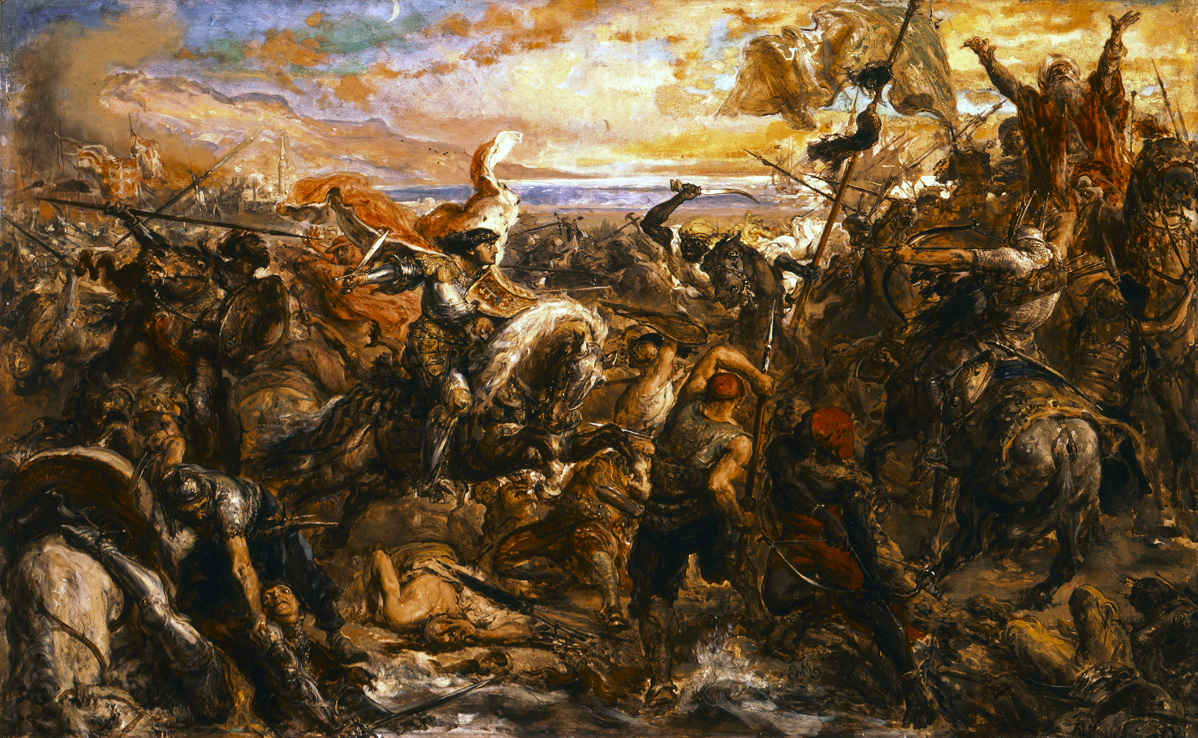
Thus all hope of aid from allies was at an end; the brave general and his small Hungarian force had to rely on their own resources, separated as they were by some weeks’ journey from their own country, while the enemy would be soon upon them in numbers five times their own. Yet, even so, Hunyady’s faith and courage did not desert him. The proverb says, “If thy sword be short, lengthen it by a step forward.” And Hunyady boldly, but yet with the caution that behooved a careful general, took up his position before the Sultan’s army. Both he and his Hungarians fought with dauntless courage, availing themselves of every advantage and beating back every assault. Already victory seemed to be assured. A few hours after the battle had begun both the Turkish wings had been broken, and even the Sultan and the brave janizaries were thinking of flight, when the young King, the Pole Wladislaw, whom Hunyady had adjured by God to remain in a place of safety until the combat should be decided, was persuaded by his Polish suite to fling himself, with the small band in immediate attendance upon him, right on the centre of the janizaries, so that he too might have a share in the victory and not leave it all to Hunyady. The janizaries wavered for a moment under this new and unexpected attack, but, soon perceiving that they had to do with the King of Hungary, they closed round his band, which had penetrated far into their ranks. The King’s horse was first hamstrung, and, as it fell, the King’s head was severed from his body, stuck upon the point of a spear, and exposed to the view of both armies. The Hungarians, shocked at the unexpected sight, wavered, and, feeling themselves lost, began to fly. All the entreaties and exhortations of Hunyady were in vain. Such was the confusion that he could be neither seen nor heard, and in a few minutes the whole Hungarian army was in headlong flight.
Hunyady, left to himself, had also to seek safety in flight. Alone, deserted by all, he had to make his way from one place of concealment to another, till after some weeks’ wandering he arrived in Hungary. The bad news had preceded him, and in consequence everything was in confusion. Again arose that difficult question: Who should be the new king under such difficult circumstances? The Sultan’s army had, however, suffered so much in the battle of Varna that for the time he left the Hungarians unmolested.
The nation was disposed to choose for its king the child Ladislaus, son of King Albert, the predecessor of Wladislaw. The child, however, was in the power of the neighboring Prince, Frederick, the Archduke of Austria, who was not disposed to let him go out of his hands without a heavy ransom. In these circumstances the more powerful nobles in Hungary took advantage of the confusion to strengthen each his own position at the expense of the nation. At first the government of the country was intrusted to a number of captains, but this proved so evidently disastrous that the better sort of people succeeded in having them abolished and Hunyady established as sole governor. For all that, however, Hunyady had a good deal of trouble with the chief aristocrats, Garay, Czillei, Ujlaki, who, envying the parvenu his sudden promotion and despising his obscure origin, took up arms to resist his authority. Thus Hunyady, instead of blunting the edge of his sword upon foreign foes, had to bridle the insubordination of his own countrymen. Luckily it did not take long to force the discontented to own the weight of his arm and his superiority as a military leader.
Order being thus to some extent reestablished at home, Hunyady was again able to turn his attention to the Turks. He felt that he had in fact gained the battle of Varna, which was only lost through the jealous humor of a youthful king; that it behooved him not to stop half way; that it was his duty to continue offensive operations. But in so doing he had to rely upon his own proper forces. It is true that he was governor of the country, but for the purpose of offensive warfare beyond the frontier he could not gain the consent of the great nobles.
Luckily his private property had enormously increased by this time. The Hungarian constitution required the King to bestow the estates of such noblemen as died without male heirs, or had been condemned for any offence, on such noblemen as had approved themselves valiant defenders of the country. Now where could be found a more worthy recipient of such estates than Hunyady, to whom the public treasury was besides a debtor on account of the sums he disbursed for the constant warfare he maintained against the Turks? Especially in the south of Hungary a whole series of lordly estates, many of them belonging to the crown, had come into Hunyady’s hands, either as pledges for the repayment of the money he had paid his soldiers, or as his own private property.
The yearly revenue arising from these vast estates was employed by Hunyady, not in personal expenditure, but in the defence of his country. He himself lived as simply as any of his soldiers, and recognized no other use of money than as a weapon for the defence of Christendom against Islam. In the early morning, while all his suite slept, he passed hours in prayer before the altar in the dimly lighted church, imploring the help of the Almighty for the attainment of his sole object in life—the destruction of the Turkish power. At last, 1448, he set out against the Sultan with an army of twenty-four thousand of his most trusty soldiers.
This time it was on the frontier of Servia, on the “Field of Blackbirds,” that Hunyady encountered Sultan Amurath, who had an army of one hundred and fifty thousand men—again more than five times the number of the Christians. Hunyady at first withdrew himself into his intrenched camp, but in a few days felt himself strong enough to engage with the enemy on the open field. The battle lasted without interruption for two days and a night. Hunyady himself was several times in deadly peril. Once his horse was shot under him. He was to be found wherever assistance, support, encouragement, were needed. At last, on the morning of the third day, as the Turks, who had received reinforcements, were about to renew the attack, the Waywode of Wallachia passed over to the side of the Turks. The Waywode belonged to the Orthodox Eastern Church. He had joined Hunyady on the way, and his desertion transferred six thousand men from one side to the other, and decided the battle in favor of the Turks. The Hungarians, worn out by fatigue, fell into a discouragement, while Hunyady had no fresh troops to bring up to their support. The battle came to a sudden end. Seventeen thousand Hungarian corpses strewed the field, but the loss of the Turks was more than thirty thousand men.
Hunyady, again left to himself, had again to make his escape. At first he only dismissed his military suite; afterward he separated from his faithful servant in the hope that separately they might more easily baffle their pursuers. Next he had to turn his horse adrift, as the poor animal was incapable of continuing his journey. Thus he made his way alone and on foot toward the frontiers of his native land. After a while, looking down from the top of a piece of elevated ground, he perceived a large body of Turks, from whom he hid himself in a neighboring lake. He thus escaped this danger, but only to encounter another. At a turn of the road he came so suddenly upon a party of Turkish plunderers as to be unable to escape from them, and thus became their prisoner. But the Turks did not recognize him, and, leaving him in the hands of two of their number, the rest went on in search of more prey. His two guards soon came to blows with one another about a heavy gold cross which they had found on the person of their captive, and, while they were thus quarrelling, Hunyady suddenly wrenched a sword out of the hand of one of the two Turks and cut off his head, upon which the other took to flight, and Hunyady was again free.
In the mean time, however, George, the Prince of Servia, who took part with the aristocratic malcontents, and who, although a Christian, out of pure hatred to Hunyady had gone over to the side of the Turks, had given strict orders that all Hungarian stragglers were to be apprehended and brought before him. In this way Hunyady fell into the hands of some Servian peasants, who delivered him to their Prince. Nor did he regain his liberty without the payment of a heavy ransom, leaving his son Ladislaus as hostage in his stead.
He thus returned home amid a thousand perils, and with the painful experience that Europe left him to his own resources to fight as best he could against the ever-advancing Turks. The dependencies of the Hungarian crown, Servia and Wallachia—on whose recovery he had spent so much blood and treasure—instead of supporting him, as might be expected of Christian countries, threw themselves in a suicidal manner into the arms of the Turks. They hoped by their ready submission to find favor in the eyes of the irresistible conquerors, by whom, however, they were a little later devoured.
After these events Hunyady continued to act as governor or regent of Hungary for five years more, by which time the young Ladislaus, son of King Albert, attained his majority. In 1453 Hunyady finally laid down his dignity as governor, and gave over the power into the hands of the young King, Ladislaus V, whom Hunyady had first to liberate by force of arms from his uncle, Frederick of Austria, before he could set him on the throne of Hungary. The young King, of German origin, had hardly become emancipated from his guardian when he fell under the influence of his other uncle, Ulric Czillei. This Czillei was a great nobleman of Styria, but was withal possessed of large estates in Hungary. As a foreigner and as a relative of King Sigismund, he had long viewed with an evil eye Hunyady’s elevation. On one occasion Hunyady had to inflict punishment on him. He consequently now did everything he could to induce the young King, his nephew, to hate the great captain as he himself did. He sought to infuse jealousy into his mind and to lead him to believe that Hunyady aimed at the crown. His slanders found the readier credence in the mind of the youthful sovereign as he was completely stupefied by an uninterrupted course of debauchery. At last the King was brought to agree to a plan for ensnaring the great man who so often jeoparded his life and his substance in the defence of his country and religion. They summoned him in the King’s name to Vienna, where Ladislaus, as an Austrian prince, was then staying, with the intention of waylaying and murdering him. But Hunyady got wind of the whole plot, and when he arrived at the place of ambush it was at the head of two thousand picked Hungarian warriors. Thus it was Czillei who fell into the snare. “Wretched creature!” exclaimed Hunyady; “thou hast fallen into the pit thou diggedst for me; were it not that I regard the dignity of the King and my own humanity, thou shouldst suffer a punishment proportioned to thy crime. As it is, I let thee off this time, but come no more into my sight, or thou shalt pay for it with thy life.”
Such magnanimity, however, did not disarm the hostility of those who surrounded the King. On the pretence of treason against the King, Hunyady was deprived of all his offices and all his estates. The document is still to be seen in the Hungarian state archives, in which the King, led astray by the jealousies that prevailed among his councillors, represents every virtue of the hero as a crime, and condemns him to exile.
Fortunately Czillei himself soon fell into disfavor; the Germans themselves overthrew him; and the King, now better informed, replaced Hunyady in the post of captain-general of the kingdom.
Hunyady, who meanwhile had been living retired in one of his castles, now complied with the King’s wish without difficulty or hesitation, and again assumed the highest military command. Instead of seeking how to revenge himself after the manner of ordinary men, he only thought of the great enemy of his country, the Turk. And indeed, as it was, threatening clouds hung over the horizon in the southeast.
A new sultan had come to the throne, Mahomet II, one of the greatest sovereigns of the house of Othman. He began his reign with the occupation of Constantinople, 1453, and thus destroyed the last refuge of the Byzantine empire. At the news of this event all Europe burst into a chorus of lamentation. The whole importance of the Eastern question at once presented itself before the nations of Christendom. It was at once understood that the new conqueror would not remain idle within the crumbling walls of Constantinople.
And, indeed, in no long time was published the proud mot d’ordre, “As there is but one God in heaven, so there shall be but one master upon earth.”
Hunyady looked toward Constantinople with heavy heart. He foresaw the outburst of the storm which would in the first place fall upon his own country, threatening it with utter ruin. Hunyady, so it seemed, was again left alone in the defence of Christendom.
The approaching danger was delayed for a few years, but in 1456 Mahomet, having finally established himself in Constantinople, set out with the intention of striking a fatal blow against Hungary. On the borders of that country, on the bank of the Danube, on what was, properly speaking, Servian territory, stood the fortress of Belgrad. When the danger from the Turks became imminent, the kings of Hungary purchased the place from the despots of Servia, giving them in exchange several extensive estates in Hungary, and had at great expense turned it into a vast fortress, at that time supposed to be impregnable.
Mahomet determined to take the place, and to this end made the most extensive preparations. He led to the walls of Belgrad an army of not less than one hundred and fifty thousand men. The approach of this immense host so terrified the young King that he left Hungary and took refuge in Vienna along with his uncle and counsellor, Czillei.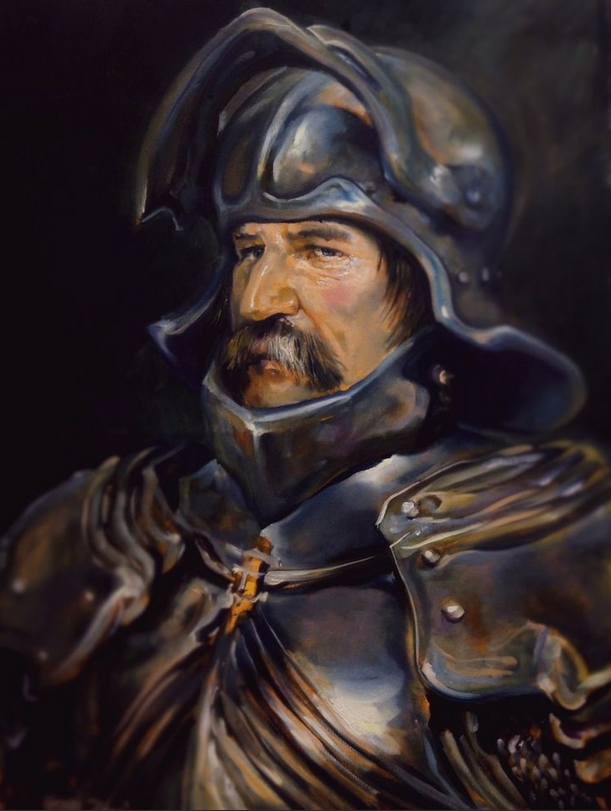
Hunyady alone remained at his post, resolute like a lion attacked. The energy of the old leader—he was now nearly sixty-eight—was only steeled by the greatness of the danger; his forethought and his mental resources were but increased. As he saw that it would be impossible to do anything with a small army, he sent his friend, John Capistran, an Italian Franciscan, a man animated by a burning zeal akin to his own, to preach a crusade against the enemies of Christendom through the towns and villages of the Great Hungarian Plain. This the friar did to such effect that in a few weeks he had collected sixty thousand men, ready to fight in defence of the cross. This army of crusaders—the last in the history of the nations—had for its gathering cry the bells of the churches; for its arms, scythes and axes; Christ for its leader, and John Hunyady and John Capistran for his lieutenants.
The two greatest leaders in war of that day contended for the possession of Belgrad. The same army now surrounded that fortress which a few years before had stormed Constantinople, reputed impregnable. The same hero defended it who had so often in the course of a single decade defeated the Turkish foe in an offensive war, and who now, regardless of danger, with a small but faithful band of followers, was prepared to do all that courage, resolution, and prudence might effect.
Many hundred large cannon began to break down the stone ramparts; many hundred boats forming a river flotilla covered the Danube, so as to cut off all communication between the fortress and Hungary. During this time Hunyady’s son Ladislaus and his brother-in-law Michael Szilagyi were in command in the fortress. Hunyady’s first daring plan was to force his way through the blockading flotilla, and enter Belgrad before the eyes of the whole Turkish army, taking with him his own soldiers and Capistran’s crusaders. The plan completely succeeded. With his own flotilla of boats he broke through that of the Turks and made his entrance into the fortress in triumph. After this the struggle was continued with equal resolution and ability on both sides; such advantage as the Christians derived from the protection afforded by the fortifications being fully compensated by the enormous superiority in numbers both of men and cannon on the part of the Turks.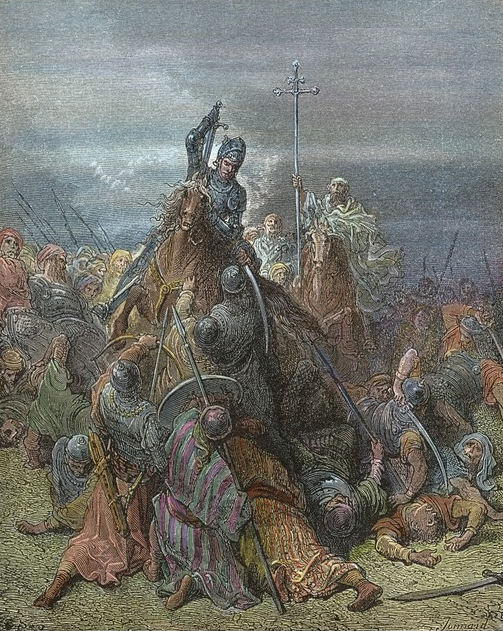
Without example in the history of the storming of fortresses was the stratagem practised by Hunyady when he permitted the picked troops of the enemy, the janizaries, to penetrate within the fortification, and there destroyed them in the place they thought they had taken. Ten thousand janizaries had already swarmed into the town, and were preparing to attack the bridges and gates of the citadel, when Hunyady ordered lighted fagots, soaked in pitch and sulphur and other combustibles, to be flung from the ramparts into the midst of the crowded ranks of the janizaries. The fire seized on their loose garments, and in a short time the whole body was a sea of fire. Everyone sought to fly. Then it was that Hunyady sallied out with his picked band, while Capistran, with a tall cross in his hand and the cry of “Jesus” on his lips, followed with his crowd of fanatics, the cannon of the fortress played upon the Turkish camp, the Sultan himself was wounded and swept along by the stream of fugitives. Forty thousand Turks were left dead upon the field, four thousand were taken prisoners, and three thousand cannon were captured.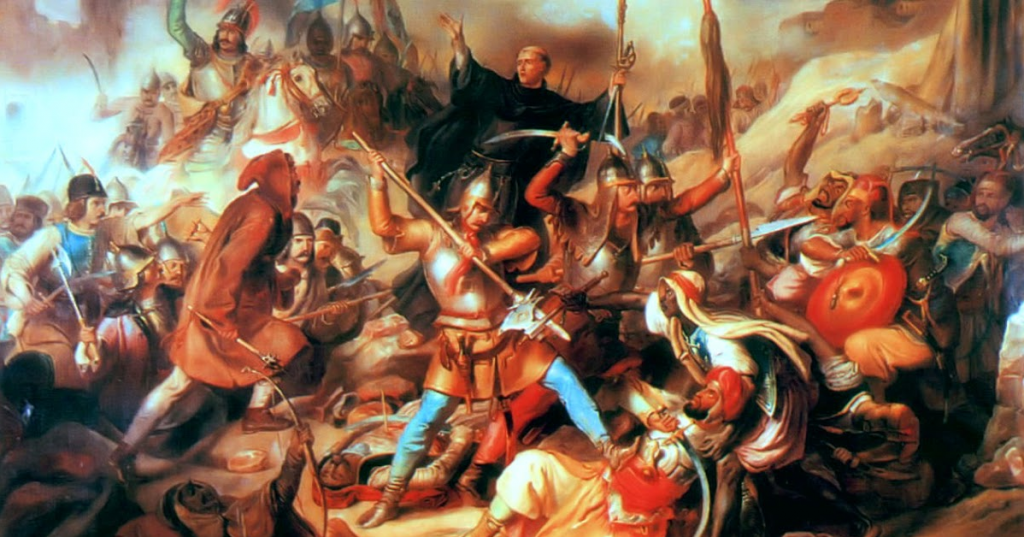
According to the opinion of Hunyady himself, the Turks had never suffered such a severe defeat. Its value as far as the Hungarians were concerned was heightened by the fact that the ambitious Sultan was personally humiliated. There was now great joy in Europe. At the news of the brilliant victory the Te Deum was sung in all the more important cities throughout Europe, and the Pope wished to compliment Hunyady with a crown.
A crown of another character awaited him—that of his Redeemer, in whose name he lived, fought, and fell. The exhalations from the vast number of unburied or imperfectly buried bodies, festering in the heat of summer, gave rise to an epidemic in the Christian camp, and to this the great leader fell a victim. Hunyady died August 11, 1456, in the sixty-eighth year of his age. He died amid the intoxication of his greatest victory, idolized by his followers, having once more preserved his country from imminent ruin. Could he have desired a more glorious death?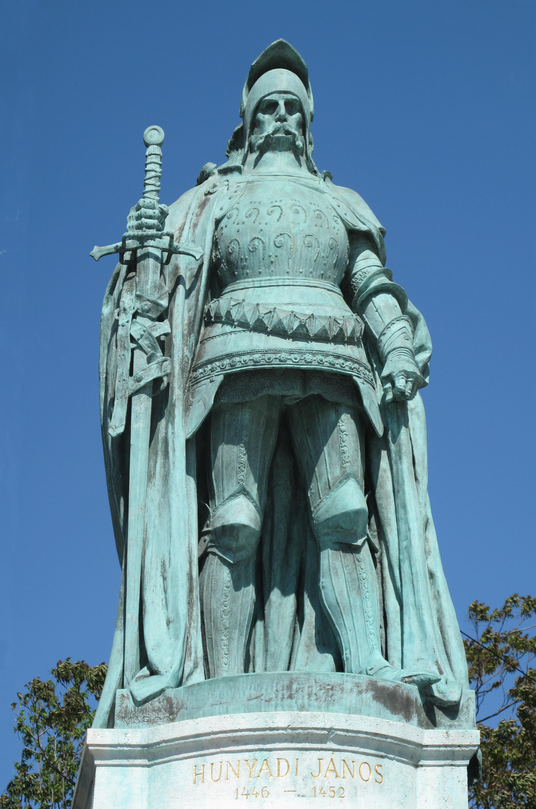
He went to his last rest with the consciousness that he had fulfilled his mission, having designed great things and having accomplished them. And the result of his lifelong efforts survived him. His great enemy, the Turk, for the next half-century could only harass the frontier of his native land; and his country, a few years after his death, placed on the royal throne his son Matthias.

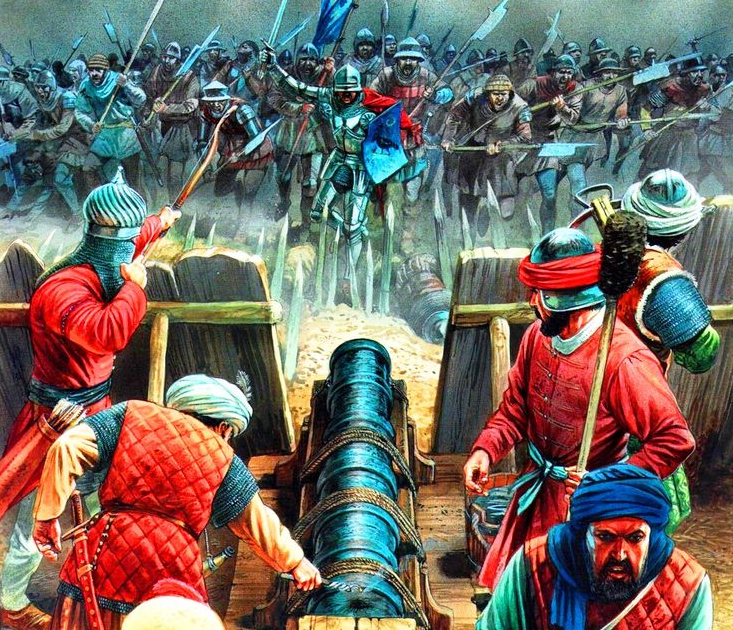


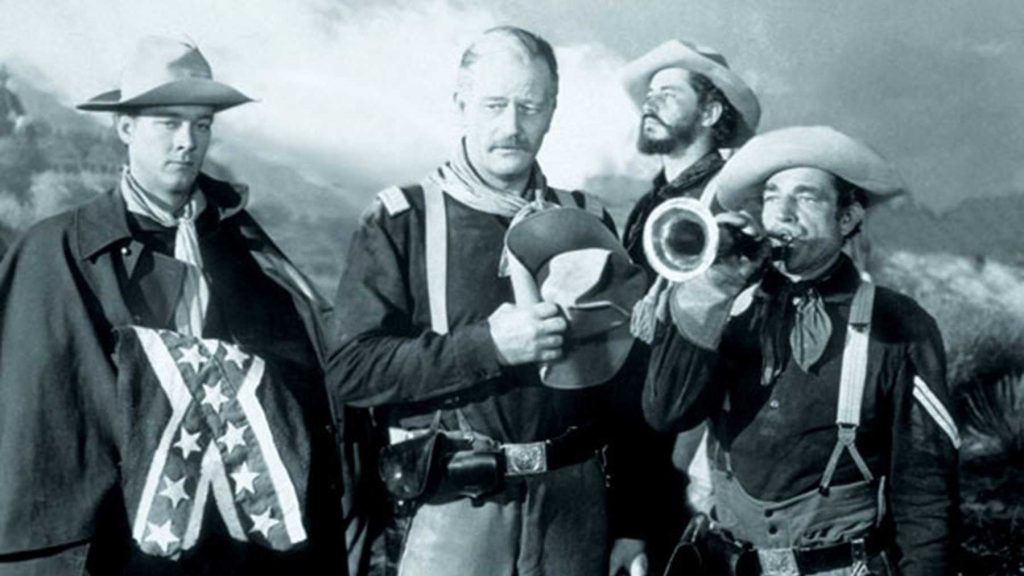





5